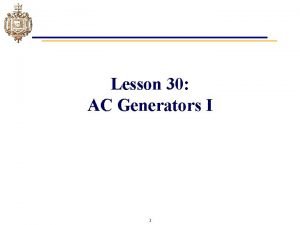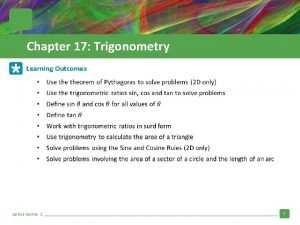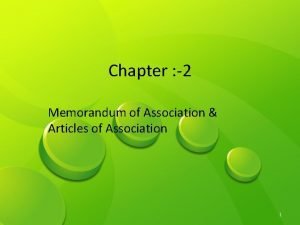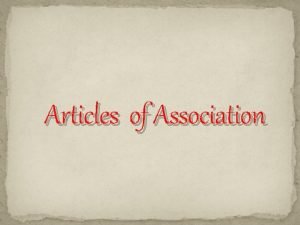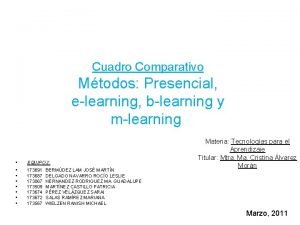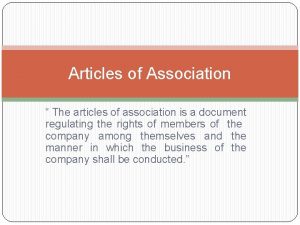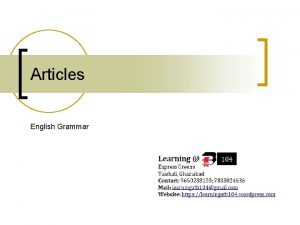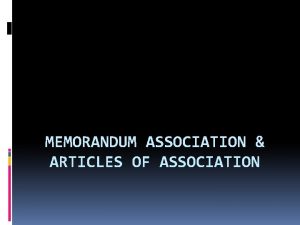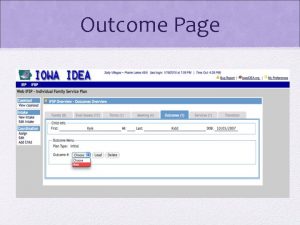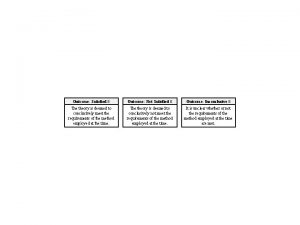Articles of Association Learning Outcome To understand the














- Slides: 14

Articles of Association

Learning Outcome • To understand the importance of Ao. A in connection with Mo. A of a company • To study the contents and alteration in Mo. A

Articles of Association : Meaning Ao. A are the rules, regulations and bye-laws for the internal management of the affairs of a company. Also, they are meant to carry out the objects of Mo. A

Definition of Ao. A Section 5 of the Companies Act, 2013 deals with AOA - The articles of a company shall contain the regulations for management of the company. The articles shall also contain such matters, as may be prescribed. - It shall be not prevent a company from including such additional matters in its articles as may be considered necessary for its management.

• • • • • Content of Articles : Share Capital, rights of shareholders, share certificate Lien on shares Call on shares Transfer of shares Transmission of shares Forfeiture of shares Conversion of shares to stocks Share warrants Alteration of Capital General meetings and proceedings Voting rights of members, voting poll, proxies Directors, their remuneration, appointment, qualification, powers Manager Secretary Dividends and Reserves Accounts, audit and borrowing powers Capitalisation of profits Winding up

Companies Act, 2013 • It is compulsory for every company to have its own articles and file the same with ROC for registration. • The articles of a company shall be in the respective forms specified in Tables G, H, I, J in Schedule I as may be applicable to such company. The liberty to have articles or in a form as near thereto as circumstances admit, which was available in the 1956 Act is no longer available in the 2013 Act. Companies Act, 1956 • Optional for a Public company limited by shares. Compulsory for other Companies. • The articles of any company, not being a company limited by shares shall be in such Tables C, D, E in Schedule I as may be applicable or in a form as near thereto as circumstances admit.

FORM : Table F (Ao. A of a company limited by shares) Table G (Ao. A of a company limited by guarantee having a share capital) Table H (Ao. A of a company limited by guarantee not having a share capital) Table I (Ao. A of a unlimited company having a share capital) Table J (Ao. A of a unlimited company not having a share capital)

Printing & Signing : (a) Printed (b) Divided into numbered paragraphs (c) Signed by each subscriber to the Memorandum (address, description, occupation, if any) (d) 1 witness to attest signature

Alteration of Articles NOTE: Right to alter cannot be deprived of by the provision or any independent contract. Provisions /Procedure: 1. Special Resolution 2. File the copy of resolution with Registrar in 30 days and attach to every copy of the Articles issued thereafter. 3. Any alteration for conversion of a public company into a private company requires the approval of the Tribunal (NCLT). Company has to file with the ROC the followings within 15 days - every alteration of the articles; - a copy of the order of the Tribunal approving the alteration alongwith - a printed copy of the altered articles

Limitations to alteration of Ao. A : 1. Must not be inconsistent with the Act. 2. Must not conflict with the Memorandum 3. Must not sanction anything illegal 4. Must be for the benefit of the company 5. Must not increase the liability of members 6. Alteration by special resolution only 7. Approval of CG when a public company is converted into a private company. 8. Breach of contract 9. Must not result in expulsion of a member. 10. No power of the Tribunal to amend the articles.

Difference : Ao. A and Mo. A 1. 2. 3. 4. 5. 6. Meaning/Content Purpose Importance Required for the company Alteration Ultra Vires Act

Constructive Notice of Memorandum and Articles : Every outsider is deemed to have notice of contents of memorandum and Articles. These public documents on registration becomes ‘constructive notice’.

Doctrine of Indoor Management The Limitation of the Doctrine of Constructive Notice is ‘Doctrine of Indoor Management’. Assumption : The outsiders assume that internal proceedings of the company are regularly done with. Constructive doctrine protects the company from outsiders And Doctrine of Indoor protects the outsiders from the company

Exceptions : 1. Knowledge of irregularity 2. Negligence (sale of company’s property by an accountant) 3. Forgery (sale of forged shares) 4. Acts outside the scope of apparent authority
 To understand recursion you must understand recursion
To understand recursion you must understand recursion A machine that converts mechanical energy into electricity
A machine that converts mechanical energy into electricity Learning objectives for poem
Learning objectives for poem Veyldf learning and development outcome descriptors
Veyldf learning and development outcome descriptors Humalog dosage scale
Humalog dosage scale Learning outcome
Learning outcome Learning outcomes example
Learning outcomes example Examples of educational goals and objectives
Examples of educational goals and objectives Association clause
Association clause Articles of association deals with
Articles of association deals with Cuadro comparativo de e-learning b-learning y m-learning
Cuadro comparativo de e-learning b-learning y m-learning Hình ảnh bộ gõ cơ thể búng tay
Hình ảnh bộ gõ cơ thể búng tay Frameset trong html5
Frameset trong html5 Bổ thể
Bổ thể Tỉ lệ cơ thể trẻ em
Tỉ lệ cơ thể trẻ em

